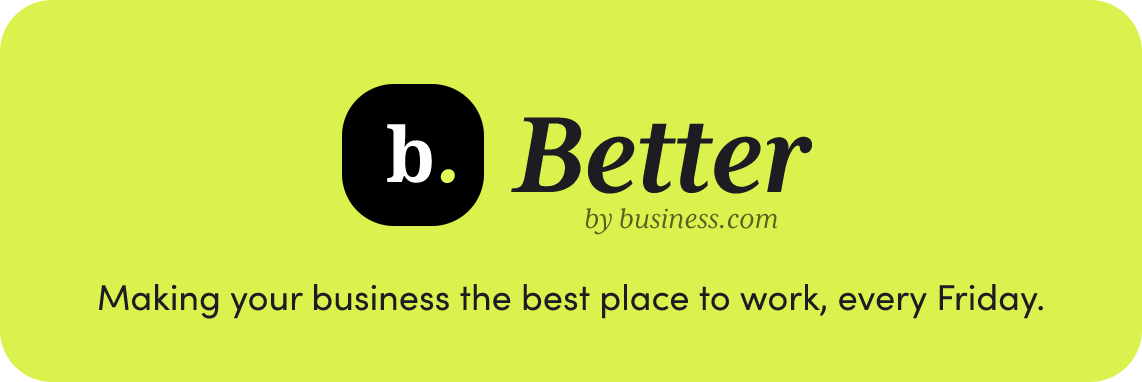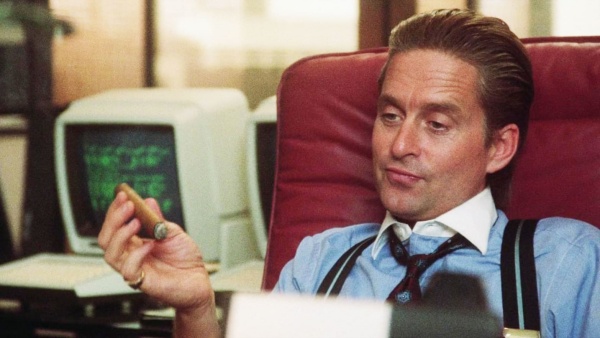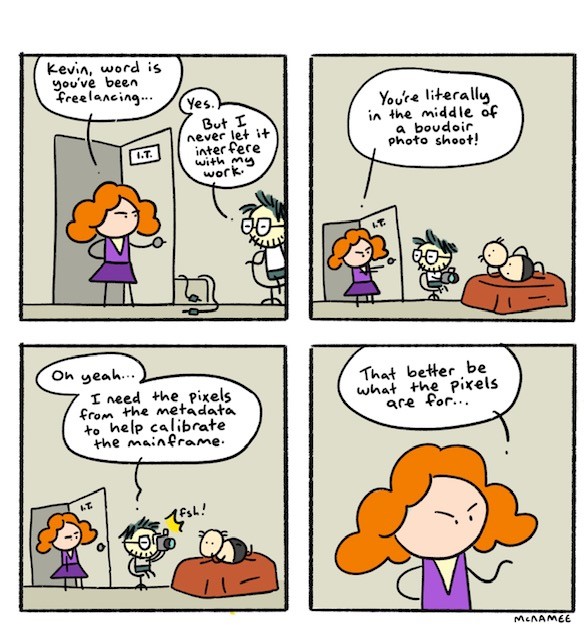Employee computer monitoring has many pros and cons. It can help safeguard documents, track attendance, and minimize procrastination — but it also raises privacy concerns, especially if employees log into their financial or health accounts at work.
New AI tools, already implemented at many major firms, go far beyond alerting HR if Facebook is open for too many minutes; they can even detect harassment, insider trading, and general employee sentiment, CNN reports. The benefits might be greater, but so are the risks of a demoralizing “Big Brother” effect.
To find the right balance for your company, check out business.com’s guide, The Best Employee Monitoring Software of 2024.
|
Movie biz: Hollywood’s worst business advice
Meetings: A better way to set the agenda
Gatorade: How it rebounded after first taste test
|
|
|
Let’s Get Ready for the Oscars With Hollywood’s Worst Business Advice
|
(Source: 20th Century Studios)
|
The 96th Academy Awards are this Sunday, and while many business-related films contain excellent gems you can use, others try too hard to sound savvy. Or, they’re classics from a bygone era with outdated advice … or audiences mistook a charismatic villain for an aspirational role model. So, we looked back at some beloved 1980s and ’90s movies to see if their famous lines still apply in today’s world.
“Lunch is for wimps.” —Gordon Gekko, Wall Street (1987)
Gordon Gekko (Michael Douglas), the stockbroker we love to hate, shared a ton of advice — not all of it legal — that embodied the cutthroat business environment of the era. But c’mon, we all need to eat. If you’re looking to thrive, it might be smarter to follow author Keith Ferrazzi’s advice: view lunch as a networking opportunity and “Never Eat Alone.”
“You can bend the rules plenty once you get to the top, but not while you’re trying to get there.” —Tess McGill, Working Girl (1988)
There was a time when junior employees would never question nonsensical corporate policies or contradict their bosses; hence, this is why Tess (Melanie Griffith) kept quiet about Katherine (Sigourney Weaver) taking credit for her idea. Now, leading companies such as Netflix encourage workers — no matter where they stand on the corporate ladder — to speak up so transparency is assured and inefficiencies get fixed. And if you’re at the top, you can benefit from listening to those on their way up.
“Think big, think positive, and never show any sign of weakness.” —Louis Winthorpe III, Trading Places (1983)
It’s hard to argue with commodities director Louis Winthorpe III (Dan Aykroyd) when he shares this warning outside the New York Commodity Exchange. Thinking big and thinking positive allow you to go after your dreams … but in today’s world, showing vulnerability will help you relate to others and forge the personal connections that get things done.
“A, B, C… Always be closing.” —Blake, Glengarry Glen Ross (1992)
While we appreciate the motivational spirit of Alec Baldwin’s speech, it neglects one of the most important facets of the sales cycle: lead generation. Without an effective lead-gen strategy, the leads are probably weak.
|
|
|
Grow Your Sales Team Into a Force to be Reckoned With
|
Sales is an ongoing necessity for any growing business, and success takes consistency, persistence, and organization. Today, that means using a customer relationship management (CRM) software to make the most of data so you can close the deal.
There’s no bigger name in the CRM software space than Salesforce, which has supported businesses in lead generation, qualification, nurturing, and closing sales for more than two decades. Personalize every step of the buyer journey for your customers, because positive experiences mean repeat business.
Ready to unify your sales, customer service, and marketing? Give Salesforce a try.
|
|
|
Set Better Meeting Agendas By Asking Questions
|
Dr. Steven Rogelberg is a chancellor’s professor at UNC Charlotte, former president of the Society for Industrial and Organizational Psychology, and author of Glad We Met: The Art and Science of 1:1 Meetings.
Setting an agenda is often touted as the cornerstone of productive meetings. However, the mere presence of an agenda doesn’t guarantee a successful meeting.
Rather than just listing agenda topics, consider framing your agenda as a series of questions to be tackled. For example:
- Swap “customer service” for “What are the key ways to enhance response time to customers by 25%?”
- Replace “stop losing key talent” with “Where are we susceptible to turnover and what are five ways we can work to address it?”
This way, you’ll approach meeting design with strategic intent and purpose. Additionally, the method helps streamline your guest list to those crucial for answering the questions, and it creates a compelling challenge to attendees that draws them into the conversation.
Finally, you’ll know when to end the meeting — because the questions have been answered. To make this approach even more effective, consider three key steps:
- As with setting precise employee goals, asking precise questions energizes and focuses collective efforts. Ensure they’re demanding yet achievable, avoiding extreme or unrealistic challenges.
- Encourage input from attendees during agenda creation. This inclusivity not only enriches discussions but also boosts engagement and commitment.
- Start the meeting with the most compelling questions, as initial topics receive the most attention.
And remember: If you struggle to generate meaningful questions, it might signal that a meeting isn’t necessary.
|
|
|
On March 8 in Business History:
|
- 1817: It’s the New York Stock Exchange’s birthday. Let’s eat some cake and hope it makes a nice wish for us.
- 1913: Feeling the pain of tax season? Income tax collections by the IRS started on this day.
- 1927: Founded today, Pan America (better known as Pan Am) was an iconic airline. After selling most of its international routes to meet operational costs, however, it filed for bankruptcy in 1991.
- 1950: The Volkswagen Bus first went into production, even though it’s most associated with the 1960s and ‘70s. Nearly 75 years after its release, VW will deliver an electric bus later this year.
|
|
|
Back in the 1960s, the University of Florida’s football team — the Gators — had a disadvantage: The intense summer heat made practicing difficult. An assistant coach met with UF scientists to find a solution, which is what they (literally) did, returning with the first iteration of Gatorade.
Designed to help athletes replace lost electrolytes and carbs on the field, this early recipe was not a hit, with some players reportedly vomiting after taking a few swigs. After making it more palatable, however, the team won their first Orange Bowl in 1967, crediting the win to Gatorade. And so did the coach of their opponents, who admitted Gatorade “made the difference.”
The scientists sold their recipe later that year, agreeing to an 80-20 royalty split with UF. Today, $7 billion worth of Gatorade sells annually and it’s the official drink of the NFL, NBA, WNBA, MLB, MLS, and several other sports leagues. And despite its early struggles with the taste test, Gatorade is consistently rated as the best-tasting sports drink.
|
|
|
Written by Dawn Allcot and Ali Saleh. Comic by John McNamee.
|
|
|
|






.png)

